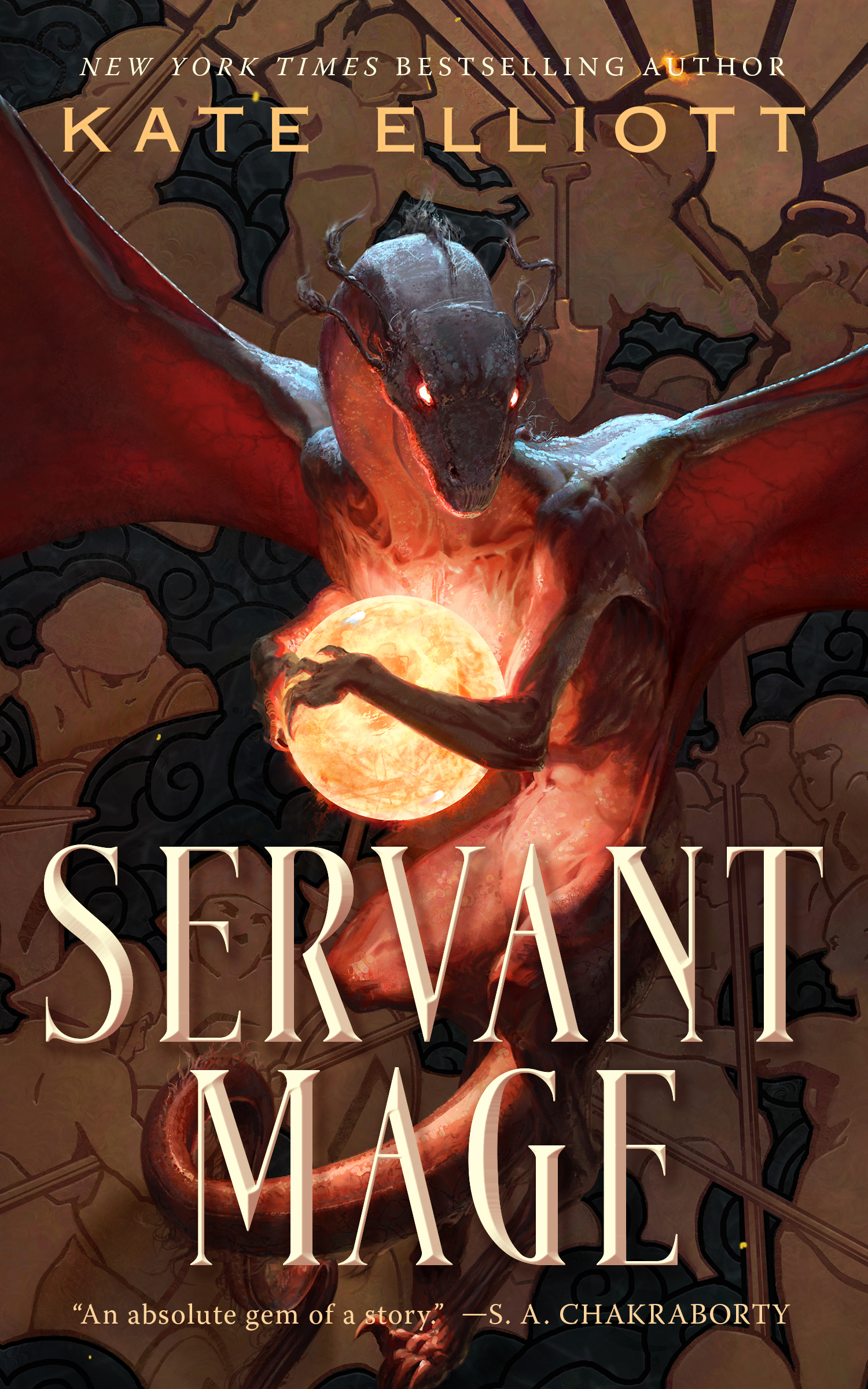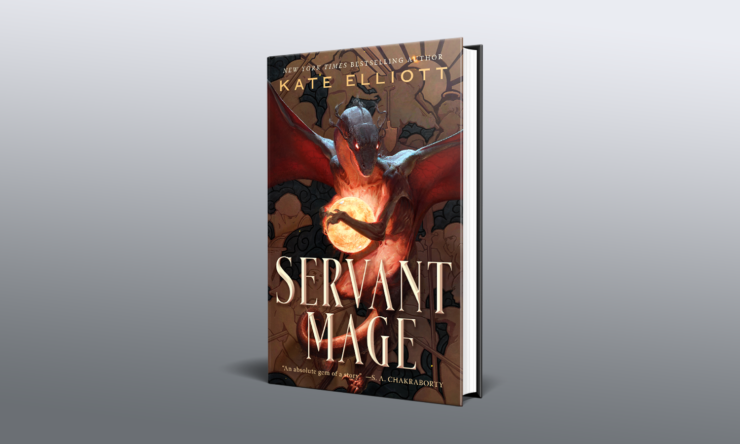So many fantasy books imagine the downfall of a corrupt, oppressive, monarchist empire. Servant Mage, a slim novella by SFF luminary Kate Elliott, is a book that asks: What then? What happens after the revolution? What happens to the noble class when their system of power falls, when the populace is trapped in the dictatorship of the proletariat in between the past and something better?
Servant Mage follows Fellian, a magician with an affinity for fire and light-magic, as she’s recruited (more like press-ganged) to help guide a rescue team through the caved-in mine. Halfway into the trek across the country, her rebel group receives word of an emergency—a five-souled child has been born, and the baby must be rescued before the Liberationists find and kill her.
What follows is a magical heist story mired in politics, power, and the shape of truth. Fellian comes face to face with the lies that the current Liberationist regime has fed her for years, including the truth about the source of magic in the world. As rebel nobles and near-Marxists battle for cultural supremacy, Fellian struggles to discern right from wrong, swept up in a struggle that is far more complicated and entangled than she had ever assumed.
Buy the Book


Servant Mage
Fellian is much less an agent of this story and much more a vehicle for Elliott to shape a world that is fantastic, expansive, and worthy of many more pages than the slim 160 that make up this novella. That’s not to say that Fellian doesn’t have character or doesn’t make some choices, but overall the plot happens around her. For a book this size, with a wonderful amount of lore and worldbuilding, propelled by non-stop action, this isn’t a deterrent. Fellian is a smart character, her voice sharp and hopeful, and Elliott uses Fellian’s just-barely-an-outsider status to pry apart the insecurities and cracks that make up the world of Servant Mage.
The book delineates two major political factions: the Liberationists, who are in power at the start of the novel, and the monarchists, who are attempting to find five-souled children in order to help them reclaim their authority. It isn’t easy to figure out which side is better or worse, and it’s clearly intentional. The moves Servant Mage makes in every single conversation, worldbuilding detail, and plot reveal, only serve to muddy the perspectives. It’s brilliantly done, and the immersion into the world is immediate.
In Servant Mage we get a world that is flawed and fractured, but in a way that feels devastatingly real. There is no black and white righteousness. Under the yoke of control, the number of people who suffer are always greater than those who thrive, even as the Liberationists state their goals are to create total social equality. But the dictatorship of the proletariat isn’t quite working. The just-off-real world political ideologies at the core of this book are its lodestone, the grounding point of the plot, deftly couched amid a fantastic turmoil, full of soul-bound elemental wraiths, cows who eat demons, and a tumultuous, mixed-up sense of real history. Here is the core of much political conflict: Us good, them bad.
[Major spoilers follow]
As Fellian moves through this world, one where the Liberationists kept her imprisoned and in an asylum, where she learned only the most basic tenets of her fire-magic and was denied the ability to return home or even purchase her freedom, we make assumptions about the ideologies at work. Fellian keeps her cohort, and the reader, at arms-length, forcing us to examine the assumption that we know what kind of political leanings breed bad judgment. Then, at the end, it’s revealed that Fellian was orphaned by the monarchists; that her family was writing and printing seditious material during the monarchists reign, and as part of their punishment, she was separated from her family and sent to the asylum to be taught as a servant mage. She tells Lord Roake, the monarchist in charge of the rebel group, that she doesn’t want to join the monarchists at all, she just wants to return home.
I don’t typically care for neat little twists at the ends of novels, much less at the ends of novellas, but the more I think about Servant Mage, the more I realize that Elliott has been building every swift-moving plot point up to this exact ending. This is a world where power corrupts, where fear rules over idealism, where sharp, jagged edges pierce through the aether and into the skin of every person who gets caught up in distant power struggles. It’s a twist, but it’s not a surprise. At the end, when Fellian tells the monarchists that they’re just as bad as every other regime, it feels cathartic. It feels right. The self-assured righteousness of the monarchists now seems hollow, suddenly more self-serving than selfless, their noble promises wilting in the wake of an account of a life shattered by their own cause.
In the final scenes, Fellian goes home. Not to the hotel where she had been indentured as a servant mage, but to her hometown, from which she was taken as a child. The final moments of Servant Mage don’t place faith in systems, but in communities, in cultural strongholds, in the roots that can be bent out of shape but never truly broken. Elliott has established a world of opposing political factions and refused to give either of them the validation they crave from people like Fellian, the people they seek to control. Fellian gets to leave, to go home with a deeper understanding of what power means to the people in power, and a knowledge of how to fight against those systems in her own life, in her own community.
With nuance and cleverness, Elliott creates a unique fantasy world that is very different from our own, but mired in the same bigotry, inefficient political machinations, and acceptable collateral-damaged population that we can recognize. The solution that Fellian finds, that she fights for, is the ability to build a community for the people who are forced to live underneath systems of control, to preserve the culture and sophistication of whatever place has survived the pressure of regimes. Fellian gets to start over, and Elliott ends the book with the subtle recognition that hope and trauma are often, indelibly, soul-bound together.
Servant Mage is available from Tordotcom Publishing.
Linda H. Codega is an avid reader, writer, and fan. They specialize in media critique and fandom and they are also a short story author and game designer. Inspired by magical realism, comic books, the silver screen, and social activism, their writing reflects an innate curiosity and a deep caring and investment in media, fandom, and the intersection of social justice and pop culture. Find them on twitter @_linfinn.










